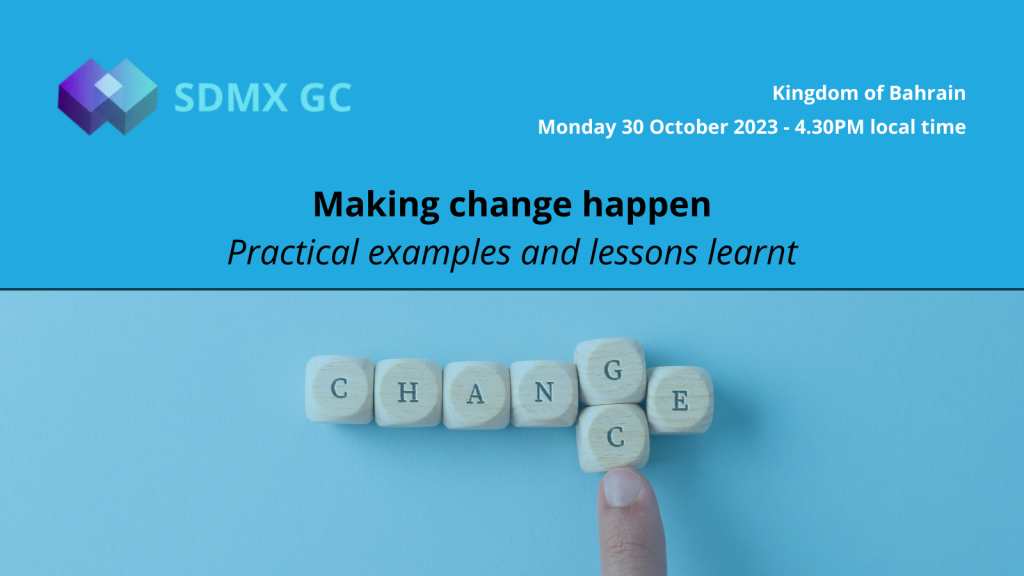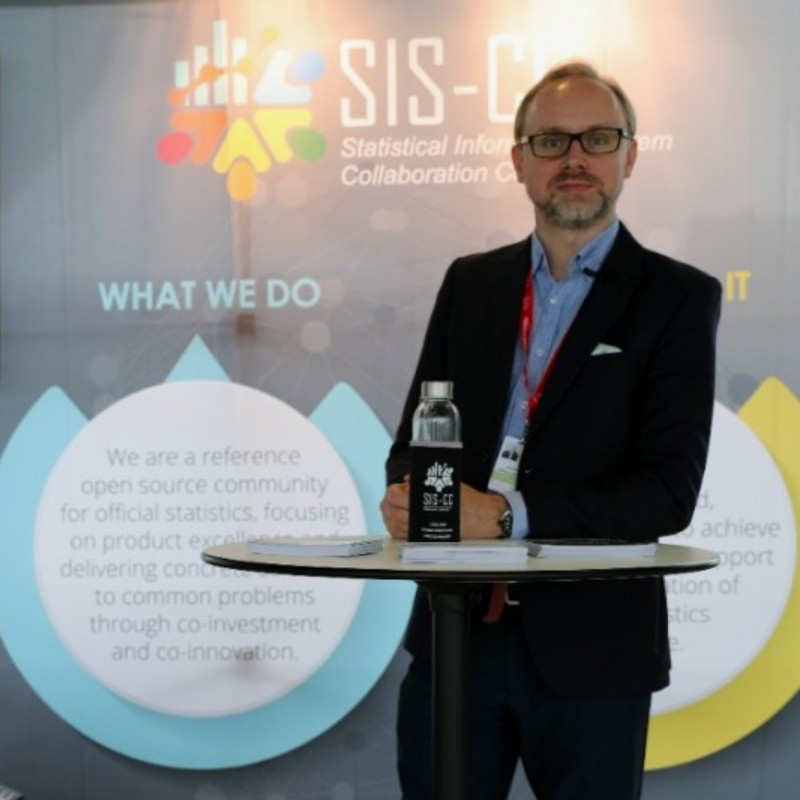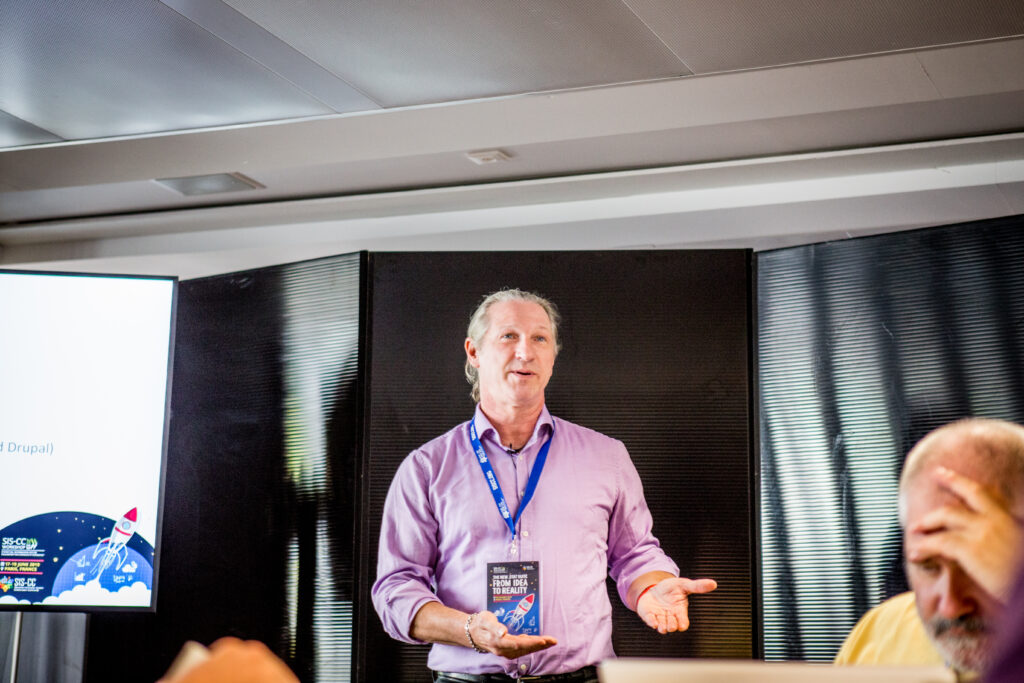Making change happen with SDMX
The recent 9th SDMX Global Conference was not just a gathering of statistics and data enthusiasts; it was an opportunity to delve into the transformative power of change. As part of the event, the Statistical Information System Collaboration Community (SIS-CC) organised a side event with a focus on SDMX.

Current approaches: Tried and tested, or broken?
The SIS-CC’s raison d’être is to serve as a reference open-source community for official statistics, emphasising product excellence and offering tangible solutions to common challenges through co-investment and co-innovation. Historically, the Community has engaged in ad-hoc capacity development projects, often with limited resources. However, in the past 2-3 years, thanks to specific funded projects, the SIS-CC has transitioned to a more structured approach, capitalising on years of experience to better support large-scale change management. This evolution is particularly evident in data and platform migration projects, with SDMX playing a central role.
But a pressing question arises: Can the community model be scaled up to meet the increasing demand for capacity building and resource investment? Jonathan Challener, SIS-CC’s Community Manager, provided insights into why change to approaches of the past (still current in some areas) is necessary. Despite a strong culture of international open collaboration, the statistical community still requires more extensive cooperation, especially in areas like capacity building, tools development, and technical assistance projects. When SDMX data governance is lacking, data usability suffers due to non-standardised structures. Moreover, SDMX is still perceived as a new a complex standard by many organisations, despite it being released almost 20 years ago.
Lessons learnt
To address the need for change, several ingredients and practical examples were explored:
1. Technology (Tools): SIS-CC already has open-source technology at its disposal, but there is still room for improvement and more innovation.
2. Understanding the Context: A one-size-fits-all approach doesn’t work. The SIS-CC aims to improve the ultimate outcomes by listening and discovery, of people, processes, and products, identifying overlaps and skills gaps
3. Capacity Building: The .Stat Academy, launched over a year ago, provides self-paced learning and is bridging existing gaps, but there’s a need for more comprehensive and scalable solutions that helps build sustainability in the long term.
4. Developing a Practice: Train the trainers to share their expertise within their organisations and the broader community, building a community of experts to become good trainers, coaches.
5. SDMX Data Governance: Implement a structural metadata governance policy (See A Reference Framework for SDMX Metadata Structural Governance), guided by the reference framework for SDMX structural metadata governance providing the cornerstone of data governance, enabling a progressive harmonisation of data semantics across domains and the data lifecycle.
6. User Research: The SIS-CC is establishing a systematic User Research to promote collaboration on User-Centered Design (UCD) principles, ensuring a user-focused approach and leveraging collective knowledge to drive product, process, and data model design and implementation.
Moving from capacity building projects to capacity development programme
The discussion also delved into the transition from capacity-building projects to a comprehensive capacity development program, focusing on the three P’s: People, Processes, and Products. Yves Jaques, Chief of the Data Frontier and Technology Unit at UNICEF, led the panel discussion, highlighting the need for better coordination and a holistic view of the data lifecycle to harness the true value of SDMX.
”Why are we overall, as broader community, not that good in making the change happen? How is our work fitting into larger questions such as digital divide, education divide?”.
Yves Jaques is the Chief of the Data Frontier and Technology Unit at UNICEF
The ILO Labour Market Information Systems (LMIS) was cited as an excellent example of transitioning from projects to a sustainable program. A coordinated approach, not only at the headquarters level but also at the country level, was emphasised as the way forward. The key takeaway was that a holistic view of the data lifecycle (DFAF) is essential to understand the true value of SDMX in the broader statistical landscape.
Mentorship and a network of mentors were identified as vital components in the journey towards sustainable capacity development. It’s not just about one-off training; it’s about a continuous mentorship process to help data practitioners navigate the complexities of the statistical world.
In conclusion, the SIS-CC’s side event at the 9th SDMX Global Conference was a platform for insightful discussions and reflections on how to make change happen in the realm of official statistics, where collaboration and innovation are the driving forces behind progress. The Statistical Information System Collaboration Community (SIS-CC) exemplifies this spirit, always striving to bring about positive change.
Presenter, chair, and panellists

Jonathan Challener is the community Manager for the Statistical Information System Collaboration Community hosted at the OECD. Jonathan has worked in data and statistics for more than 15 years, in the UK, New Zealand, and at international level with the OECD, combining his experiences from both public and private sectors in data and business process analysis, project delivery, and technology driven changes in support of open data strategies, to build a reference open-source community for official statistics through co-investment and co-innovation.
More recently, Jonathan has led the implementation of the .Stat Academy, an online self-paced learning hub to build capacity in the .Stat Suite and Data modelling in SDMX, and is the co-author of the Data Flow Analysis Framework, a set of guidelines for NSOs to map relevant processes using a data-centric view to capture the current state (“as-is”) and to determine recommendations for the enhanced state (“to-be”).

Yves Jaques is the Chief of the Data Frontier and Technology Unit at UNICEF. Yves has broad experience managing data and IT-driven product portfolios. He has led tech teams in the private and public sector across domains as diverse as epidemiology, agriculture, and retail analytics. Following several years as the technical director for big data and machine learning at WGSN, a New York fashion forecasting company, he is currently Chief of the Frontier Data and Tech Unit delivering on data science, spatial data, and open data solutions in the service of global UNICEF.

Stéphane Crête works as a manager for the center for statistical and data standards in Statistics Canada. As a data (standards) architect, Stéphane is a vocal advocate for the adoption of standards including those for data exchange and metadata management, and he plays a key role in their implementation across various data domains within Statistics Canada.

José Vereecken joined the National Bank of Belgium in 1987 as an IT developer having previously worked at a private technology firm in Ghent, Belgium. José has combined both his technical and functional knowledge over a long period at the NBB taking up project positions as a functional analyst and in his current role since 2016 as a business analyst working on a reengineering project at External Statistics Service to develop an application from collecting data to aggregated data. Since the last 2-3 years José has been key member of the SALSA project with SDMX and .Stat Suite at the core. As part of the same project José has been leading the work coordinating the Data Modelling Community of Practices for different domain working groups, where they describe and define the data (structure, content, purpose).

Fadhila Najeh holds an MSc degree in Business Intelligence from the Higher Institute of Management in Tunisia and has 17 years of experience in the statistical field. Fadhila started working with SDMX in 2016, and has had the opportunity to support the implementation of multiple SDMX projects at National and International Organisation, which gave her the opportunity to develop her expertise in the use of several SDMX tools and platforms, mainly the .Stat Suite platform. She is currently a Data Modeler in the Office of Chief Statistician (OCS) in FAO, in charge of data migration under the SDMX format in the framework of the Statistical Data Warehouse (SDW) project.

Edgardo Greising is the Head of the Knowledge Management Solutions Unit, Department of Statistics, at the International Labour Organisation (ILO). Edgardo joined the ILO in June 2011, prior to which, he worked at the National Statistics Office and the Social Development Ministry of Uruguay, and as a consultant for several international organisations in the field of statistical data processing and information systems. He participates in several committees and working groups for the modernization of official statistics and represents the ILO at the UN Geospatial Network. He has chaired the SDMX Technical Working Group for the last two terms and is now joining the Secretariat representing the ILO. Edgardo has been a member of the Management Level Group since the ILO joined the SIS-CC in 2016.

Rafael Schmidt works for the Bank for International Settlements (BIS) in the Monetary and Economic Department (MED) where he is managing the BIS’ statistical data processing, analysis, and disseminations systems. SDMX forms a central element in the aforementioned systems. He presently serves as the Chairman of the SDMX Secretariat. Before joining MED, he worked in the Bank’s Risk Management Department managing the Risk Methodology/IT team.
Rafael taught as an assistant professor at the University of Cologne and the London School of Economics and Political Science. Rafael holds university degrees in Mathematics, Economics, and Statistics. He has a PhD and a habilitation in Financial Statistics and Econometrics.

Abdulla Gozalov is a statistician at the United Nations Statistics Division (UNSD). He has designed and developed many statistical information systems, and for the last 10 years has focused on SDMX and capacity development projects with National Statistical Offices. Abdulla is UNSD’s focal point on SDMX, and coordinator of the Working Group on SDMX for SDG indicators.